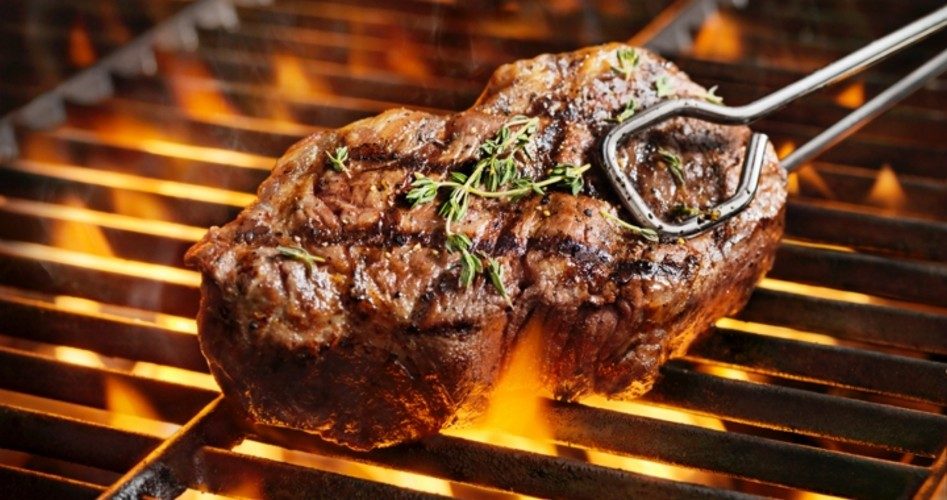
“You mean there was no deep fat? No steak or cream pies or … hot fudge?” asked the Dr. Melik character, incredulously, in the film Sleeper’s future world. “Those were thought to be unhealthy,” replied colleague Dr. Aragon — “precisely the opposite of what we now know to be true.”
We’re not there yet, but a new analysis is turning diet doctrine on its head. As American Thinker’s Thomas Lifson reports, “High cholesterol, particularly LDL cholesterol, has been demonized for allegedly bringing on heart attack deaths. But an intriguing analysis of data published at Medium.com seems to show that total mortality risk is reduced by high cholesterol levels, even LDL cholesterol.”
The point Medium.com’s P.D. Mangan makes is that even if lower cholesterol is associated with reduced heart-disease incidence, this is more than offset by an increase in low-cholesterol-associated health risks.
As Mangan puts it, from “a public health standpoint, it seems a mistake to focus on changing something that lowers the risk of death from one cause only to raise that risk from another.”
Mangan provides three charts illustrating the data. He also lists a number of possible reasons for the findings:
Cholesterol may protect against infections and atherosclerosis.3
Cholesterol may protect against cancer.4
A strong association was found between low cholesterol and violence. Odds ratio of violence for cholesterol of <180 mg/dl was 15.49. 5
Several studies have found an association between low cholesterol and suicide. For instance, one study found that those in the lowest quartile (fourth) of cholesterol concentration had more than 6 times the risk of suicide as those in the highest quartile.6
“People feasting on bacon and eggs or Kobe beef are unlikely to kill themselves or anyone else, all right,” Lifson concludes.
“More often, they feel like a nap, I can report based on rigorous testing of myself,” he continues.
Joking aside, Lifson makes the point that coming “on top of the news that eggs are good for you, and so is butter, while the trans fats in margarine make it unhealthy, this suggests that nutrition experts cannot be trusted, for they don’t know nearly as much as they pretend to know — with implications not just for global warming, but for the populist movement in general, rebelling against the educated professional and academic classes” that control advanced economies.
Quite true. It was the epitome of hubris when Michelle Obama purported expertise in devising a diet for every American schoolchild, starving lanky, active, high-metabolism, growing teen boys in the process. Worse still, as Lifson noted, is that this arrogant ignorance (and agenda pushing) is also evident in major issues such as climate change and “transgender” pseudo-science.
As for health, many studies contradict the “narrative.” Certain research has found, for example, that being slightly overweight is associated with longer life spans. Other studies indicate that the Victorian diet of our 19th-century forebears was superior to our modern menu.
Whatever the ideal diet, some lessons are apparent here:
• Most experts, well, aren’t. Consider how often the Supreme Court’s legal “experts” split 5-4, meaning that roughly half of them are wrong. The takeaway is that the average practitioner in any field is just that — average — with many worse still and only a few brilliant standouts (who are often impugned by the lesser lights).
• As I reported in “Blinding Me With Science: Fraud and Folly for Fame and Funding,” a staggering percentage of scientific papers are outright fraudulent while many others are ideologically influenced. Explanation? Scientists are people, not perfect beings. Some do good work, while others are corrupted by a desire for fame (getting published) and for money in the form of government grants, and by politics. Thus did the Soviet Union have its Lysenkoism — and thus do we have our politically correct “science” today. (Apropos to this, American Thinker is currently running an article on “elite” medical journals’ unreliability.)
• Many media can’t be trusted to deliver good science news. First, most reporters aren’t qualified to properly analyze research findings. Second, the media have a vested interest in presenting fringe, fanciful science because it’s the “Man bites dog story” that attracts eyeballs. A good example was the science journal Nature’s 1992 article “Will Women Soon Outrun Men,” which claimed that female runners would equal their male counterparts in the marathon by 1998 and in shorter distances by our time. The reality: The intersex running performance gap actually widened after 1995.
As for the second point above, I’ll avoid accusations of contradiction by saying that, yes, we have to apply skepticism to the “cholesterol is good studies,” too. Discernment is always imperative.
As to this, I’ll share my philosophy of health (no money-back guarantee offered!):
• “Everything in moderation.” As the toxicological principle informs, “The dose makes the poison,” meaning that we can safely metabolize a certain amount of anything, though that amount varies by substance.
• Stick with foods as close to their naturally occurring state as possible — e.g., butter instead of margarine, less processed over more so.
• Avoid stress when possible and cultivate a mindset that doesn’t breed it. That is to say, people with a higher perspective — people of faith — tend to instinctively keep things in perspective; smaller perspectives breed small-mindedness and the sweating of the small stuff.
• Drink enough water.
• Get ample sleep and remember the counsel “early to bed and early to rise.”
• Avoid leftists.
And since laughter is sometimes the best medicine, I’ll leave you with the Sleeper scene referenced in my opening line
As for me, I have to go. It’s almost 11 a.m. and I haven’t had my ice cream sundae yet.
Photo: LauriPatterson/E+/Getty Images



